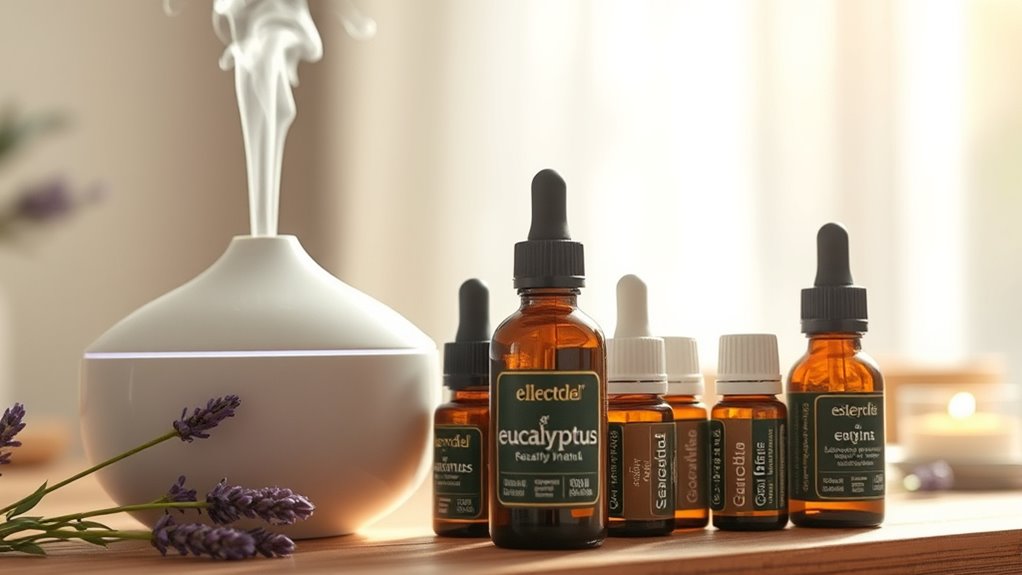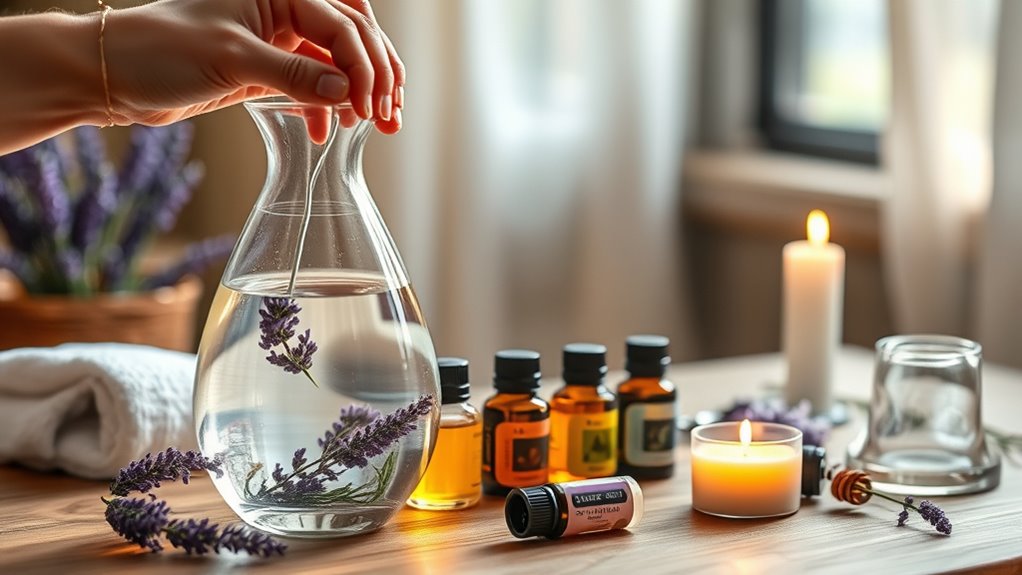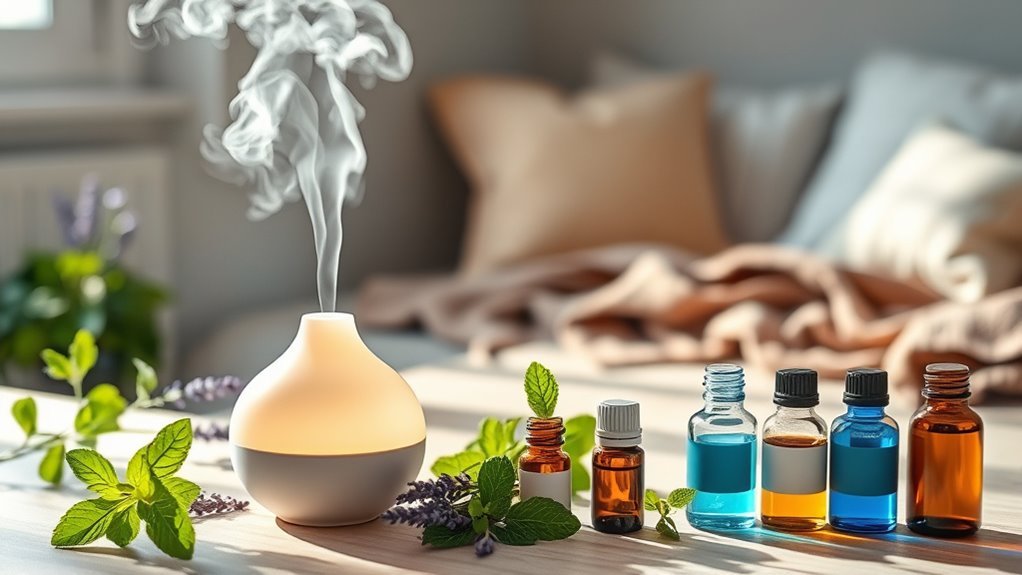To safely use aroma for stress relief, always dilute essential oils properly and opt for high-quality, pure products. Use diffusers in well-ventilated spaces for no more than 30-60 minutes. Avoid synthetic fragrances, overapplication, and applying undiluted oils directly to your skin. Keep oils away from children and pets, and store them correctly. If you follow these guidelines, you’ll experience the best benefits—discover more tips to enhance your aromatherapy journey.
Key Takeaways
- Always dilute essential oils properly before skin contact to prevent irritation and adverse reactions.
- Use high-quality, pure oils and artificial scents to ensure safety and effectiveness.
- Limit diffusing sessions to 30-60 minutes in well-ventilated spaces for optimal stress relief.
- Avoid overusing oils and applying undiluted oils directly to the skin.
- Keep oils out of reach of children and pets, and perform patch tests before extensive use.
The Essential Do’s for Safe and Effective Aromatherapy

To guarantee you get the most benefits from aromatherapy while staying safe, it’s important to follow some essential do’s. Start with aroma safety tips by always diluting essential oils properly before use, especially if applying to your skin. Use high-quality, pure oils to avoid adverse reactions. Incorporate stress relief techniques like diffusing oils in a well-ventilated space and limiting exposure to 30-60 minutes. Always perform a patch test to check for sensitivities before extensive use. Keep oils out of reach of children and pets. Remember, moderation is key—overuse can lead to headaches or irritation. Additionally, tracking your aromatherapy sessions helps you monitor effectiveness and ensure safe usage. By following these essential do’s, you ensure a safe, enjoyable experience that enhances your stress relief techniques without risking your health.
Common Don’ts to Avoid When Using Aromas for Stress Relief

While aromatherapy can effectively reduce stress, there are common mistakes you should avoid to ensure safety and benefits. One major don’t is using synthetic fragrances, which can contain chemicals that irritate your skin or cause adverse reactions. Avoid relying on these artificial scents, and opt for natural, pure essential oils instead. Another mistake is overusing oils; applying too much or too often can lead to headaches, skin irritation, or overwhelm your senses. Remember, more isn’t always better—use only a few drops and follow recommended guidelines. Also, don’t forget to dilute essential oils properly before applying them to your skin. Additionally, be cautious about storage and quality to maintain the effectiveness and safety of your essential oils. By steering clear of synthetic fragrances and overuse, you’ll enjoy the calming effects of aromatherapy safely and effectively.
Frequently Asked Questions
Can Aromatherapy Replace Traditional Stress Management Techniques?
Aromatherapy efficacy varies from person to person, so it can’t fully replace traditional stress management techniques. While it offers a relaxing, accessible option, it works best as a complementary method rather than a standalone solution. Compared to traditional therapy, aromatherapy provides immediate stress relief but lacks the depth of professional guidance. You should combine both approaches for ideal results, ensuring you address stress holistically rather than relying solely on aroma.
Are There Any Side Effects From Prolonged Aroma Use?
Prolonged aroma use can lead to long-term effects like skin irritation or headaches if you’re sensitive. You might also experience allergic reactions, such as sneezing or breathing issues. To avoid these, use essential oils in moderation, dilute properly, and pay attention to how your body responds over time. If you notice any adverse effects, stop using the aroma and consult a healthcare professional.
How Do I Choose the Right Essential Oils for Stress Relief?
Choosing the right essential oils for stress relief starts with scent selection that resonates with you. Trust your nose and opt for high-quality oils to guarantee purity and effectiveness. Look for labels that specify 100% pure, therapeutic-grade oils, and consider calming scents like lavender, chamomile, or ylang-ylang. Your personal preference matters most, so experiment with different options until you find the aromas that soothe your mind and elevate your mood.
Is It Safe to Use Multiple Scents Simultaneously?
Yes, it’s safe to use multiple scents simultaneously if you practice scent blending and aroma layering carefully. You should combine complementary essential oils to enhance relaxation without overwhelming your senses. Start with small amounts and observe how the scents interact. Make sure to use high-quality oils and avoid overloading your space. This approach allows you to create a personalized, calming environment without risking irritation or adverse reactions.
Can Children or Pregnant Women Safely Use Aromatherapy for Stress?
Think of aromatherapy as a delicate dance—children safety and pregnancy precautions are your guiding steps. You can use certain essential oils safely, but always dilute and consult healthcare providers first. Children and pregnant women are more sensitive, so avoid strong scents and essential oils with potential risks. By respecting these boundaries, you shield their well-being and ensure the calming power of aroma nurtures securely, like a gentle breeze guiding you through a peaceful garden.
Conclusion
Remember, when it comes to aromatherapy, safety should always be your guiding star. Stick to proven methods, avoid overdoing it, and listen to your body’s signals. Just like a trusted friend, the right aromas can comfort and calm—if used wisely. Don’t let the allure of scents turn into a storm; instead, let them be your gentle breeze through stressful times. Embrace these tips, and let your senses lead you to serenity.










